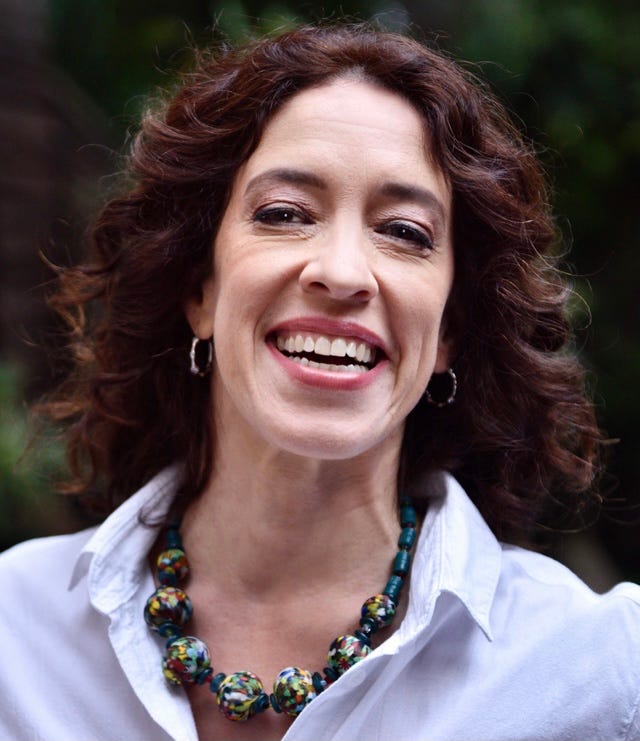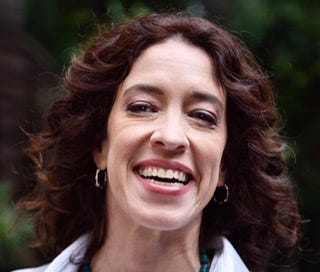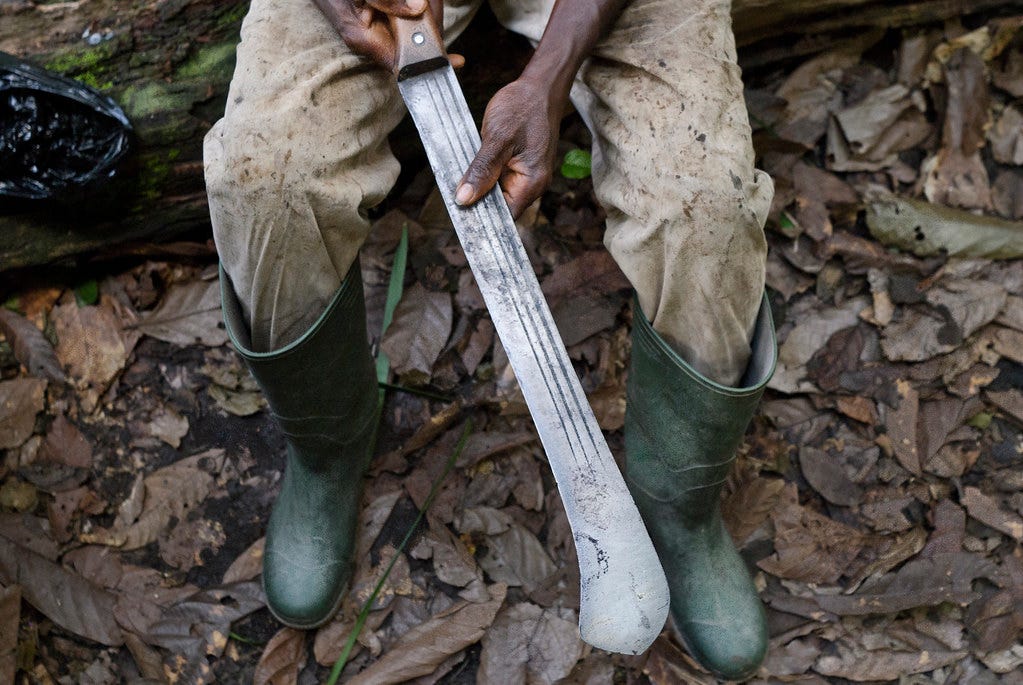Update from February 21, 2025: This interview was originally published in 2021.
Hello friends,
Welcome to this week’s edition of Sifting, shifting, and lifting . . . a weekly column in which I ask clever, curious, compassionate people my three favourite questions. (Apologies for getting this issue out a few days late. I promise; it is worth the wait.)
Today, I am introducing you to Dr. Kristy Leissle (aka @docofchoc). I first encountered her when I attended a virtual webinar she delivered on radical listening in cross-cultural research. I took copious notes, started to look at images differently, listened a little more intently (or tried to), and almost immediately followed her on Instagram. I also reached out to ask if I could feature her here. (Readers, she said “yes.”)
Last week, I had a thoroughly engrossing chat with her care of Zoom. She was in Accra, Ghana and I was at my home in Canada’s Pacific Northwest. I am delighted to share that conversation here with you today.
Ready?

Dr. Leissle is the author of Cocoa, a volume in the Polity “Resources” series. She is creator of the series, “I am a cocoa farmer,” for ConfectioneryNews, which profiles women and men who farm cocoa for a living across sub-Saharan Africa.
She publishes regularly in academic journals, newspapers, and magazines, and contributes to Oxford Analytica Daily Briefs. She is currently researching for her next book, on Africa’s role in the global chocolate industry.
With Moutia Murheb, Dr. Leissle is Co-Founder of the Cocoapreneurship Institute of Ghana, which supports entrepreneurs working at any stage of the cocoa value chain in West Africa.
Her public scholarship has included talks and events at Oxford University, University of Ghana Legon, London School of Economics, Museum of History and Industry (Seattle), as well as major academic and chocolate conferences, festivals, museums, and libraries around the world.
Dr. Leissle holds degrees from Oxford University, University of Washington, and Boston College. She lives in Accra.
What issue engages your head, heart, and hands now?
I really love this question. And I'm so thankful to you for asking it. There are obviously a lot of issues that are always on my mind when it comes to my research. But the one that has been most persistent over the years, and especially these last four years, when I've been living full time in in Ghana, is the issue of how the people I research—cocoa farmers—are represented, and that is generally in a negative way.
Ideas about cocoa farmers in West Africa circulate, and those ideas tend to be pretty much fixated on the issue of child labor. There are two things that I will say about that. One is that there's no denying children are sometimes harmed in the process of participating in farming activities. But how extensive is that harm? How broad is it? That is a question that has not been answered. There are some estimates. But the truth is, we don't really know the extent of the problem that we're dealing with. That doesn't seem to matter. It's the only issue that anyone wants to talk about even though there's not a lot of good data.
The second issue is that we, as human beings, rely on stereotypes. We’re comfortable categorizing groups of people. I don't know why. But I know that we, as humans, like to look at other humans and group them and say, this is the thing that defines that group, right?
Because this issue of child labor is so much discussed, it has become the thing that defines all cocoa farmers in West Africa, and even all people in West Africa. And I think we cannot separate the fact that we are talking about conversations that mostly happen within groups of people who are white, who haven't spent time in West Africa, who certainly are not from West Africa, who generally work in centres of power—in institutions or businesses or companies that are generally located in Europe or North America. And this group of people is talking about a group of people who are Black and African who participate in an agricultural lifestyle that does not look much like the office work that they do.
For me, you can't separate out these things. You have people talking about people with a very different life experience and making assumptions that there is blanket cruelty; universal immorality; and, you know, enormous neglect of children. This is what's assumed about Black West Africans if you're talking about cocoa.
It's an issue that is much on my mind, because I think representations matter. As writers, as artists, we are aware of how representations have real world impacts. And what then is the impact of this? Like, what's the material impact as far as where resources are directed? What's the psychological impact? I have a tiny bit of a window, a glimpse, because farmers tell me: “We don't like this. We don’t appreciate that people ‘outside’—as they would say here in Ghana, meaning anywhere else in the world—are going to say these things about us. It's not true. It's not how we live our lives.” They convey to me their frustration.
As Halloween approaches, we see appeals to buy chocolate that does not support child labor. What are your thoughts?
We don't have to look any further than the way that many companies and organizations decide what counts, and what doesn't count, as safe to understand that this is a race-based thing. Agriculture is agriculture. There is no agricultural society in the world that does not involve the whole family in production. To the extent that that's harmful or not, I don't feel like it's for me to say, because I am not an agriculturalist. I’d rather we ask the farmers themselves, but nobody really seems to do that.
[They say] “if you want safe chocolate, don't buy anything from West Africa.” To me, that is like saying a pretty racist thing. There are whole sections of the world that are left out or that are presumed to be safe. If you're saying it's only people in West Africa who are ‘bad’ and everybody else is ‘good’, what are you saying? There are a lot of unexamined assumptions behind that. But that, unfortunately, is the way that most institutions and even individuals approach it. “Okay, if it's not from West Africa, I'm assuming it's safe.”
I think if we make this a bottom-up approach and start talking to farmers, if we say: what are the biggest challenges in your life, what needs to be changed, what needs to be fixed? I don't think that child labour would be discussed nearly as much as it is.
What artist or work of art has had a profound impact on the way you see the world and your place in it?
When I was thinking about that question, honestly, I was really I was surprised at what came up for me. There are two things I’d like to share.
I've been very influenced by different art forms and different artists. I'm truly not a big social media person, but I really love the Hello, Sierra Leone Instagram account because, as you can see from the pictures, it is everyday life. It is beauty. It's things that are surprising about Sierra Leone.
Sierra Leone is the seventh or eighth poorest country in the world. There is no doubt that when most people think about Sierra Leone, they almost certainly will think about Ebola. They’ll think about civil conflict, which had a tremendous and devastating impact on this country.
I researched in Sierra Leone. I have heard firsthand how horrific both the civil conflict and Ebola were there. I'm not saying that those things aren't real and I'm not discounting their impact. But I am deeply grateful for another window into this country. I'm happy when I look on this Instagram account, and I see some really cool fashion. I see this staircase climbing up into a tree canopy; a child writing on what looks like a long piece of parchment paper; a woman having her hair braided exquisitely for what is maybe some ceremony.
I mean, this is also true, right? This is also true. I will never not think about the challenges there, and the devastation there. I'm grateful to see some more wholeness. If we're only focused on the most devastating parts of life, we cannot really understand any one else's existence, because our lives are not just bad or negative. I would rather understand people fully.
We're not very good at holding two seemingly contrary thoughts at the same time, right?
Yes, when I'm researching, I have to be open to contradiction. I have to be open to the fact that a farmer might say, “the price is too low for cocoa, but I make a good living from cocoa.” They could say those things and often do. Contradiction is a part of life and contrast is a part of life and I prefer to engage in that way.
Did you say you have a second response to the question?
When I was teaching at the University of Washington for many years—I taught in African Studies—I taught a class called “Africa on film”. (I do a lot of work on visual media, and a lot of work on film.) In every class, we studied a different film about Africa or ideally produced within Africa. If I had to pick one that was most influential on me, it would be the film Amandla: a revolution in four part harmony
That film is basically the story of resistance to apartheid, over several generations, through music. The soundtrack was deeply influential on my life. The film itself was deeply influential for me. It was a profound comprehension that cultural forms are political and can be used very effectively for political ends. I encountered that film before I started my Ph. D. program, before I began analyzing culture in the way that I do now. That film showed me that something as terrible and tenacious as apartheid could be resisted through song. Many of the songs highlighted in that film were not about apartheid, but about everyday life and the way that Black South Africans lived their everyday life as fully as possible, because that itself was resistance against apartheid. People falling in love, getting married, having children, that was interpreted in song as resistance, because apartheid only ever wanted Black South Africans to be diminished. Just the fact of living was resistance.
There are so many good organizations working to transform our world through compassionate action. Who would you like to lift up?
Yes. I work closely with a cooperative in Ghana, a cocoa cooperative, called Abocfa. They have Fairtrade certification. They have organic certification. They sell cocoa to many companies that take a very explicit, no slavery stand.
I asked the managing director, what do you need? What would help you? The most recent thing he said to me was, “we need cutlasses”—a cutlass is what we would call a machete here—so I'm currently fundraising for cutlasses for farmers. They’ve given me a target of 200 cutlasses, which is about $2,000.
What I want to express about this is that the cutlass, or machete, is, in many ways, a symbol of danger or harm. It inspires fear when it is part of a visual representation of Africa. And we don't have to look any further than another film I used to teach every year, which is Hotel Rwanda, to remind ourselves that the image of an African man bearing a machete was almost iconic as a symbol of having something to fear about Africa and kind of an essentialist portrayal of Black African men as violent aggressors.
What I really appreciated very deeply about the managing director of Abocfa saying “the first thing we need is cutlasses” is it really is the God's honest truth that, for a [West African] farmer, the main tool is a cutlass. That's it. You need it to do your work. Without one, you cannot work. I'm talking to you on my laptop. If I didn't have my laptop, I couldn't do my work. I spilled some water on my laptop a few months ago, and I was absolutely paralyzed for weeks, if not months. I couldn't do my work. It's the same for a farmer without a cutlass.
I'm glad to be doing this project, and I'm glad to be raising funds. It is very symbolic, and it's something extremely helpful that the farmers really need. If I reach my target, I plan to deliver their cutlasses to them in December. It will be considered a donation of enormous practical help. So often, that's what farmers need: practical help.
Help Abocfa give cutlasses to cocoa farmers.
To contribute to the fundraiser, please DM Dr. Kristy Leissle (@docofchoc):
Not yet a subscriber? Pull up a chair. There is always room for one more.
Before you go
Would you do me a small favour? If you enjoy reading Sift. Shift. Lift. please take a moment to like, share, or comment below. It is a simple gesture, but it gives new-ish publications like Sift. Shift. Lift.—and creators like me—a much-appreciated boost.
Thank you my friends.






Super interesting... thanks Shelley